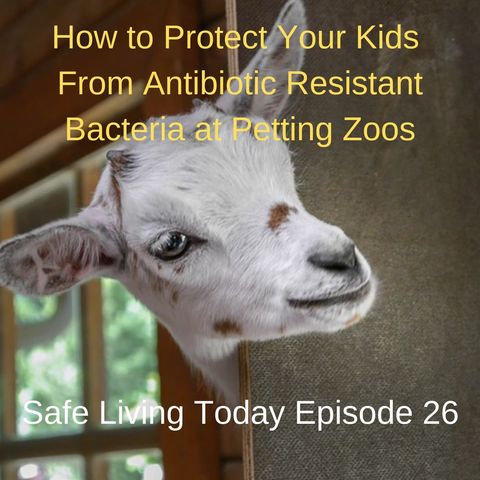How to Protect Your Kids From Antibiotic Resistant Bacteria at Petting Zoos

Download and listen anywhere
Download your favorite episodes and enjoy them, wherever you are! Sign up or log in now to access offline listening.
Description
Protect Your Kids at Petting Zoos From Drug Resistant Bacteria Show Notes: A new study finds petting zoos can be breeding grounds for drug resistant bacteria (MDR) including e coli....
show moreShow Notes:
A new study finds petting zoos can be breeding grounds for drug resistant bacteria (MDR) including e coli. These bacteria can place anyone touching animals at risk, particularly young children.
This study was done by researchers from Ariel University in Israel. They choose eight petting zoos at random, collecting fecal matter samples and swabs from fur, skin, and feathers from 228 animals representing 42 species.
Of particular interest were two bacteria types, extended spectrum beta-lactamase (ESBL) and AmpC-producing Enterobacteriaceae (AmpC-E). These bacteria are known to be highly resistant to antibiotics.
About 12% of animals were colonized with at least one of the bacterial strains. Researchers discovered 35 bacterial species including two strains of e coli. E coli can cause serious The authors found that nearly 1 in 8 animals (12%) were found to be colonized with at least one of the two antibiotic-resistant bacterial strains, with 35 different recovered species of bacteria.
A quarter of animals that tested positive for drug-resistant bacteria had more than one bacterial strain, including two e. coli strains. E coli can cause serious diarrhea and other infections.
According to researchers, children are at elevated risk of illness from these pathogens.
One of the Researchers Speaks:
Professor Shiri Navon-Venezia at Ariel University, one of the researchers, comments,
“Our findings demonstrate that animals in petting zoos can result in shedding and transmission of MDR pathogens that may cause illness for human visitors, even when the animals appear healthy,”
She continues (note: the professor was identified as "he" in the audio. My apology for the error),
“We recognize the high educational and emotional value of petting zoos for children, therefore, we strongly recommend that petting zoo management teams implement a strict hygiene and infection control policy, together with rationalized antibiotic policy, in order to reduce the risk of transmission between animals and visitors.”
Common Sense Precautions
If you take your kids or grandkids to petting zoos, apply these common sense precautions:
- No food or drink consumption by kids until after they have visited and touched all of the animals AND HAVE WASHED THEIR HANDS AND EXPOSED SKIN COMPLETELY.
- Don’t let them touch any objects that will be touched by other people during the time they’re interacting with petting zoo animals.
- If there is any indication an animal is being treated with antibiotics, don’t let children touch or come near that animal.
- As soon as possible, change children’s clothing. Place the clothing items directly in the washer and wash the clothes in hot water and dry with high heat.
- Ensure YOU wash your hands and exposed skin after touching clothes worn by children at the petting zoo.
For more, “Safe Living Today” episodes, visit us at www.SafeLivingToday.com.
Sources and Resources
“Petting Zoos May Be Crawling With Drug-Resistant Bacteria, Putting Kids At Risk”. https://www.studyfinds.org/petting-zoos-multi-drug-resistant-bacteria/.
European Society of Clinical Microbiology and Infectious Diseases. "Petting zoos could potentially transmit highly virulent drug-resistant bacteria to visitors." ScienceDaily. ScienceDaily, 14 April 2019. www.sciencedaily.com/releases/2019/04/190414111457.htm
Information
| Author | Stephen Carter |
| Organization | Stephen Carter |
| Website | - |
| Tags |
Copyright 2024 - Spreaker Inc. an iHeartMedia Company

Comments